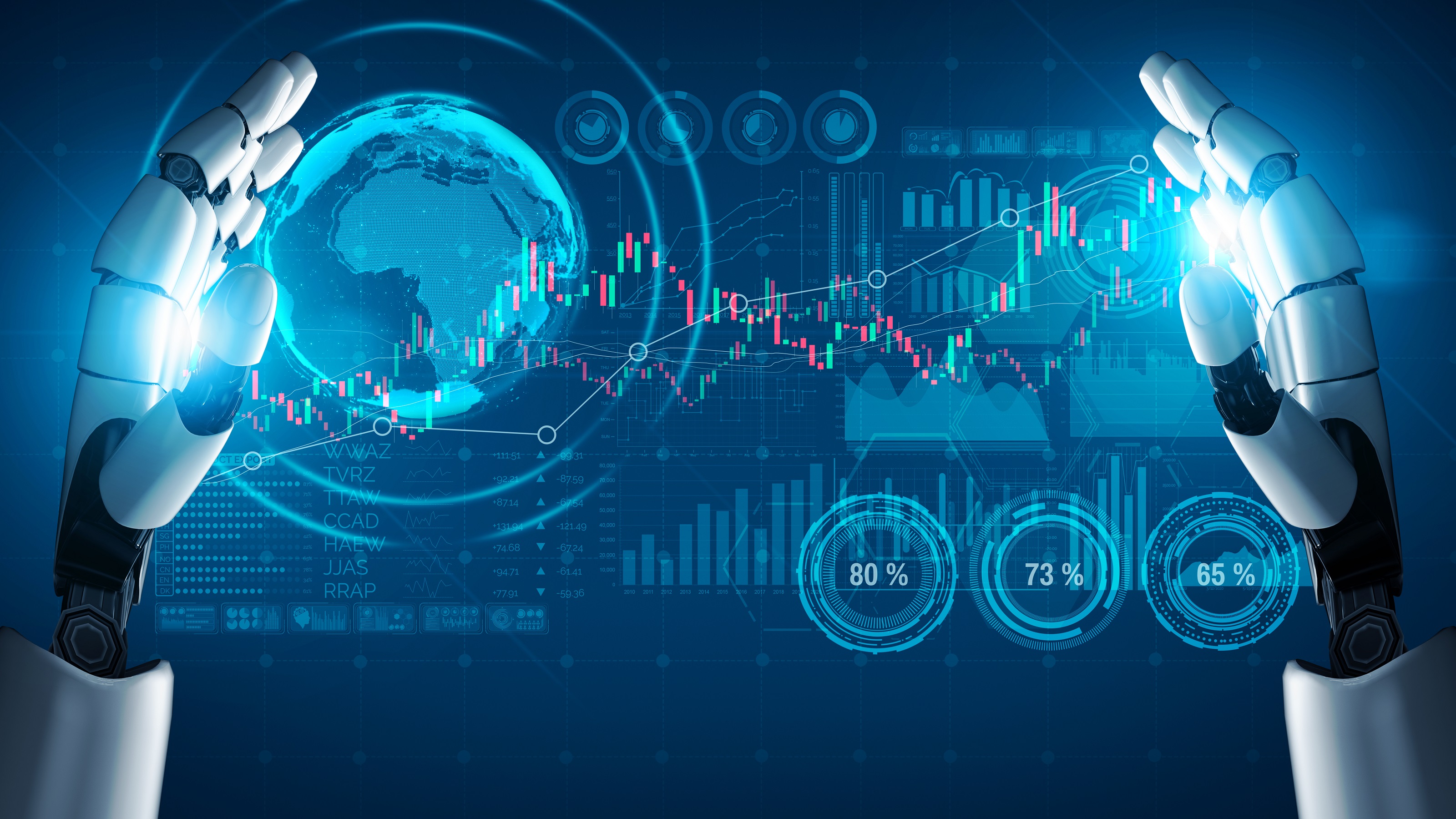Humans Invented AI and We Will Determine Its Fate
Scary scenarios aside, the future of AI depends largely on how consumers and investors fund its evolution.


Profit and prosper with the best of Kiplinger's advice on investing, taxes, retirement, personal finance and much more. Delivered daily. Enter your email in the box and click Sign Me Up.
You are now subscribed
Your newsletter sign-up was successful
Want to add more newsletters?

Delivered daily
Kiplinger Today
Profit and prosper with the best of Kiplinger's advice on investing, taxes, retirement, personal finance and much more delivered daily. Smart money moves start here.

Sent five days a week
Kiplinger A Step Ahead
Get practical help to make better financial decisions in your everyday life, from spending to savings on top deals.

Delivered daily
Kiplinger Closing Bell
Get today's biggest financial and investing headlines delivered to your inbox every day the U.S. stock market is open.

Sent twice a week
Kiplinger Adviser Intel
Financial pros across the country share best practices and fresh tactics to preserve and grow your wealth.

Delivered weekly
Kiplinger Tax Tips
Trim your federal and state tax bills with practical tax-planning and tax-cutting strategies.

Sent twice a week
Kiplinger Retirement Tips
Your twice-a-week guide to planning and enjoying a financially secure and richly rewarding retirement

Sent bimonthly.
Kiplinger Adviser Angle
Insights for advisers, wealth managers and other financial professionals.

Sent twice a week
Kiplinger Investing Weekly
Your twice-a-week roundup of promising stocks, funds, companies and industries you should consider, ones you should avoid, and why.

Sent weekly for six weeks
Kiplinger Invest for Retirement
Your step-by-step six-part series on how to invest for retirement, from devising a successful strategy to exactly which investments to choose.
The debate over whether artificial intelligence (AI) is humanity's greatest threat or greatest hope has reached a fever pitch, and everyone seems to have an opinion. A recent survey from Maveron and A/B Consulting found that Americans are nearly evenly split on the matter: 37% of consumers are excited about AI, while 40% are fearful. They are similarly divided on its potential impact: 39% believe AI will make humans obsolete, while 41% do not.
As with previous technological innovations and disruptions, the truth about AI will land somewhere in the middle. It all depends on who gets their hands on it and what they do next.
Bound up with this truth must be a greater understanding about what this technology is and is not, and who it is for. Whether you're an investor, consumer or corporate decision maker, it's easy to be wooed by every new product and platform appending "AI" to its name. It takes a discerning eye, and some unbiased education, to separate hype from genuine utility.
From just $107.88 $24.99 for Kiplinger Personal Finance
Become a smarter, better informed investor. Subscribe from just $107.88 $24.99, plus get up to 4 Special Issues

Sign up for Kiplinger’s Free Newsletters
Profit and prosper with the best of expert advice on investing, taxes, retirement, personal finance and more - straight to your e-mail.
Profit and prosper with the best of expert advice - straight to your e-mail.
At this critical moment, and over the next few years, we will collectively be responsible for how AI is used to transform business and society – by being selective about the applications we embrace and, importantly, which we put our technological, financial and emotional resources behind.
The many promising upsides of AI
In the right hands, AI has tremendous potential to add efficiency to our lives, performing complex calculations with unfathomable speed and freeing up human capital for more creative pursuits.
We are already seeing examples of this play out as our phones finish our sentences to help us communicate more quickly, and as smart lights manage the flow of traffic so we can arrive at our destinations sooner. Customer service chatbots have grown more sophisticated and helpful, and our shopping and streaming recommendations are more spot-on than ever. Such small, almost unseen AI-based technologies that improve our quality of life are all around us. When people stop and think about it, they often realize that AI intersecting with their lives is not a future concern, it's a present reality.
There are also plenty of institutional examples, from innovations in agriculture to the manufacturing supply chain to autonomous vehicles. Major retailers use AI to improve logistics, tractor companies to automate and improve farming, and pharmaceutical giants to accelerate R&D.
My company, Silent Eight, uses machine learning as an augment to human intelligence in fighting financial crime, improving the accuracy and speed with which banks and other financial institutions can meet their regulatory requirements and root out money laundering, terrorist financing and the funding of human trafficking. We think most people, apart from financial criminals, would agree that that's a positive use case.
Beware of bandwagons and bad actors
As promising as artificial intelligence undoubtedly is, it can also be leveraged for ill intent – or, perhaps equally insidiously, as "AI for AI's sake" – especially with billions of dollars flowing into companies laying claim to the next big innovation.
Although adding AI to a company's name or tech stack might be a great way to attract publicity and funding, it is not a panacea for every problem that technology, broadly speaking, aims to solve.
And, of course, not every company that says it is solving the world's problems through AI or machine learning is doing anything of the sort, no matter how slick its marketing. Those of us who were around for the dot-com bubble likely remember Pets.com's swift rise and fall, and in the past year or so, we’ve seen the implosion of many a "crypto" venture.
For these reasons, artificial intelligence and machine learning applications should be evaluated with the same scrutiny and eye for applicability as any other solution. Likewise, they are only worth implementing if they are the best fits for the job.
But there are more serious consequences to consider, beyond bad investments and bungled tech budgets. Mishandled, AI technology has the power to put not just money – but lives – at stake.
I don't mean that in the way we've seen depicted in movies, with people becoming governed by robot overlords. Rather, a slip-up in a healthcare context, or a glitch with an autonomous vehicle, has life-or-death consequences. In my business, a misstep could result in a criminal enterprise accessing the financing it needs to commit a horrific act.
And because AI can only analyze and make predictions based on existing data – and existing data bears the biases of the people who created, gathered and interpreted it – it is susceptible to perpetuating these biases. This has manifested in corporate recruitment tools, in the criminal justice system and in medicine. Algorithms won't recognize those patterns in themselves or each other, so they cannot be left unchecked.
Shaping AI with our informed choices
Companies that leverage AI with the right intent and understanding of its power will reveal themselves through their transparency about how they use the technology, acknowledgment of its limitations, and prioritization of the role of human beings in their overall business models.
Again, as consumers or backers of this technology in whatever capacity, our choices will determine which of these companies succeed or fail, for good and for bad. As you evaluate which ones are worthy of your patronage, consider these three criteria:
- Does the company use AI selectively and appropriately, everywhere ("for AI’s sake"), or only in marketing?
- Does company leadership invite scrutiny and testing, and do they understand that close oversight of AI is crucial to realizing its potential?
- Does the company acknowledge the critical role of human intervention in screening for biases and, more broadly, the things humans can do and algorithms cannot?
What happens next with AI is largely up to how consumers and investors fund its evolution. We should be looking critically at which companies are adding AI to their name to jump on a lucrative bandwagon vs which understand its power and will harness it responsibly and for good.
Related Content
Profit and prosper with the best of Kiplinger's advice on investing, taxes, retirement, personal finance and much more. Delivered daily. Enter your email in the box and click Sign Me Up.

Matthew Leaney is chief revenue officer of Silent Eight, which uses artificial intelligence to fight financial crime.
-
 Nasdaq Leads a Rocky Risk-On Rally: Stock Market Today
Nasdaq Leads a Rocky Risk-On Rally: Stock Market TodayAnother worrying bout of late-session weakness couldn't take down the main equity indexes on Wednesday.
-
 Quiz: Do You Know How to Avoid the "Medigap Trap?"
Quiz: Do You Know How to Avoid the "Medigap Trap?"Quiz Test your basic knowledge of the "Medigap Trap" in our quick quiz.
-
 5 Top Tax-Efficient Mutual Funds for Smarter Investing
5 Top Tax-Efficient Mutual Funds for Smarter InvestingMutual funds are many things, but "tax-friendly" usually isn't one of them. These are the exceptions.